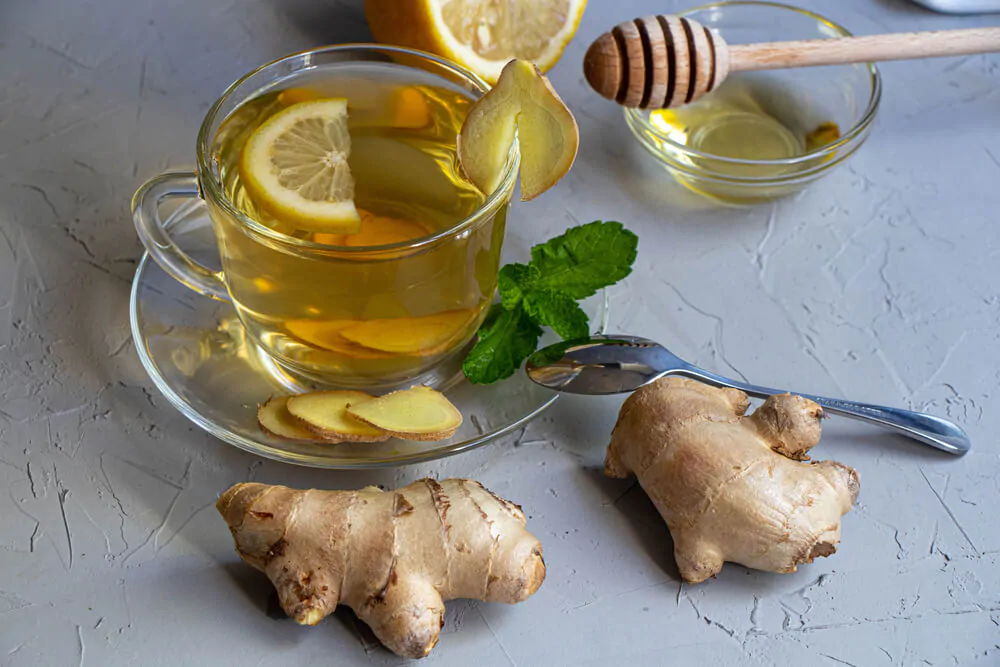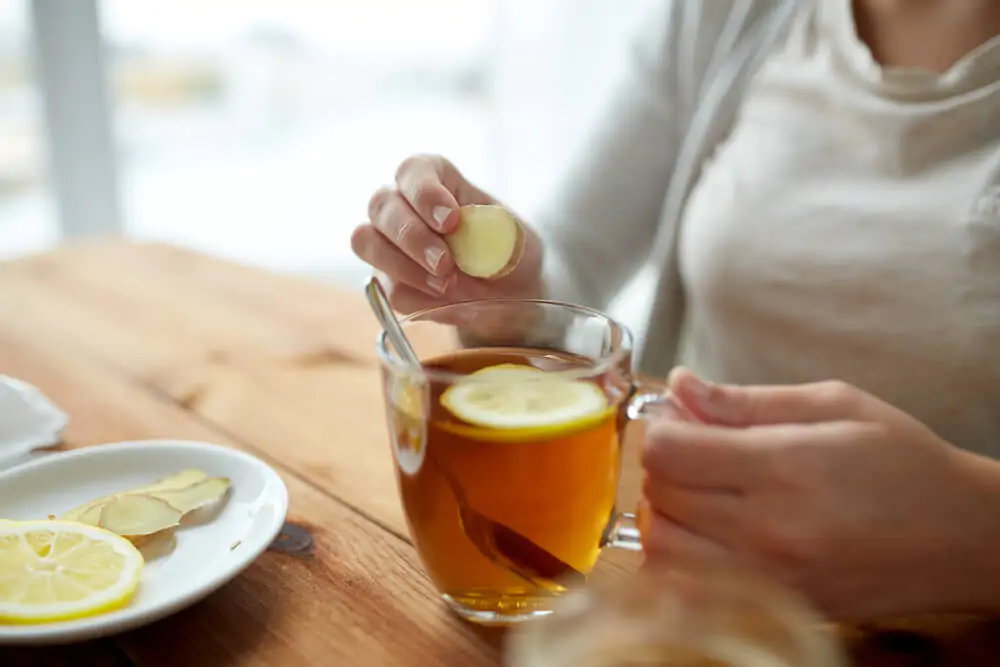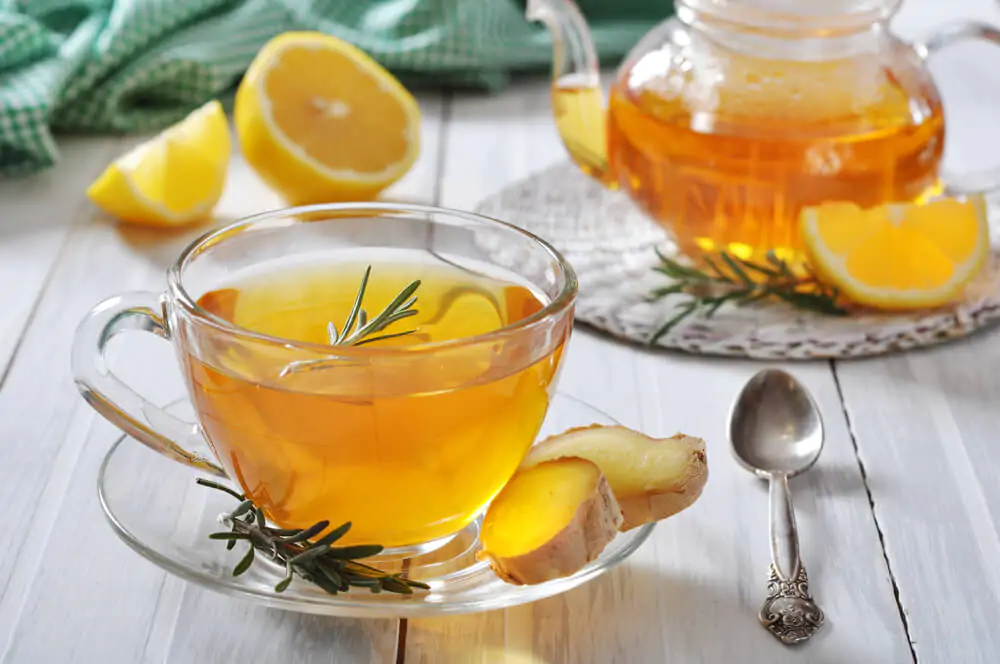What is ginger tea? Ginger tea is a soothing, refreshing, and caffeine-free alternative to regular tea or coffee known for its medicinal benefits.

Traditionally, ginger has been used to remedy nausea, cough, colds, and motion sickness. One of the most popular ways of consuming it is ginger tea – made with either boiling the peeled root or using a teabag.
Although ginger is generally considered safe, it is still important to consume it in moderation. Keep reading to learn more about the potential health benefits and risks of drinking ginger tea, as well as who should avoid it and why.
Ginger Tea Benefits

Drinking ginger tea comes with many health benefits, some of which are scientifically proven, including:
1. Relieves Digestive Discomfort
Ginger tea is commonly used to aid digestive issues, particularly in treating nausea. A study shows that drinking ginger tea might be as helpful as medication without the same side effects.
2. Anti-Inflammatory
Ginger contains gingerols, can act as antimicrobial agents. They are also anti-inflammatory.
3. Reduces Blood Pressure
Research conducted in 2017 noted that those who regularly consumed ginger had a lower hypertension risk. Although the study was not about ginger tea in particular, it is still promising.
4. Weight Loss
There has been quite a little research about the benefits of ginger regarding weight loss. Ginger can positively impact obesity, as it can help control one’s appetite and increase thermogenesis. This research was also not specifically about ginger tea, but it’s still worth trying.
5. Eases Migraines And Headaches
Many studies have been about ginger and its ability to ease pain, especially for people struggling with migraines or headaches. Thus, ginger tea can give you relief.
6. Rich In Antioxidants
Ginger is a rich source of antioxidants. Research found it can suppress tumor cell growth – particularly pancreatic cancer and colon cancer. Drinking ginger tea on a regular basis can help prevent these illnesses.
7. Relieves Period Cramps
If you struggle with period pain, drinking ginger tea may help ease cramps. Studies show that ginger can be just as useful as taking over-the-counter painkillers such as ibuprofen. Another study showed that ginger successfully reduces period pain and how long it lasts.
8. Aids Digestion
Ginger tea can also aid digestion. Ginger may ease gastrointestinal symptoms and aid overall digestive health. So, drinking ginger tea is good after a meal, or if you’re having trouble with your digestive system.
9. Reduces Muscle Pain
Drinking ginger tea can also help in reducing muscle pain, aches after a workout. It can also help in treating pain caused by chronic illness or old injuries.
10. Good For Oral Health
Ginger contains antimicrobial and antifungal properties, which can help kill oral pathogens harmful to your teeth. Drinking ginger tea can help keep your teeth safe, as well as improve your overall health.
Side Effects Of Ginger Tea
Although it is uncommon, ginger tea may still cause some side effects, especially when consumed in large amounts. The potential ginger tea side effects may include:
- Abdominal Pain
- Bloating
- Heartburn
- Slowed Blood Clotting
Ginger also has a distinct taste; that’s why it might not be for everyone. Plus, some people may experience the side effects mentioned above.
In addition, due to its ability to lower blood-pressure, it should be drank in moderation – especially by people who experience low blood pressure or taking blood pressure medications.
Does Ginger Tea Have Caffeine?

So, does ginger tea have caffeine? Ginger roots have no caffeine, and most herbal tea blends that contain ginger are caffeine-free. If you’re drinking tea infused with ginger, like chai tea or lemon ginger tea, the drink will likely have caffeine. The ginger plant does not produce caffeine – only a few natural plants can make it, such as the tea plant Camellia sinensis.
Read more on how much caffeine is in tea.
How To Brew Ginger Tea
There are many kinds of ginger tea, so there’s no one way to brew ginger tea. We suggest steeping tea leaves in boiling water for a flavorful mix of ginger and black tea or ginger and herbal tea.
If you’re using ginger tea, ensure the hot water has cooled down a little. Steep green tea for two minutes, black tea for up to five minutes, and herbal teas for more than five minutes. The longer the ginger is steeper for, the more the spicy flavor profile will shine through.
How Do I Introduce Ginger Tea To My Regular Diet?
You can drink ginger tea whenever you want. A cup of ginger tea when you wake up is an excellent way to start the day, but you can also drink it after your meal to aid digestion.
You can add honey or lemon or buy flavored tea bags (lemon and ginger, or ginger green tea). If you liked this post, you might also enjoy our guide on how to cold brew loose leaf tea.
